Real estate marketing strategies to grow your business
If you're a property investor or developer, then you know that marketing your development project is critical to its success. But what are the best ways to market a property development? And how do you target the right people?
The real estate marketing strategy you employ to market your new development project will dictate how many units you sell and the overall ROI on your investment in marketing the property.
To put it simply, if you don't market your property correctly, you won't sell it – there are thousands of new developments being built every year, so why would people choose yours over another? Follow the seven steps discussed below to ensure that you get the most out of your real estate marketing strategy.
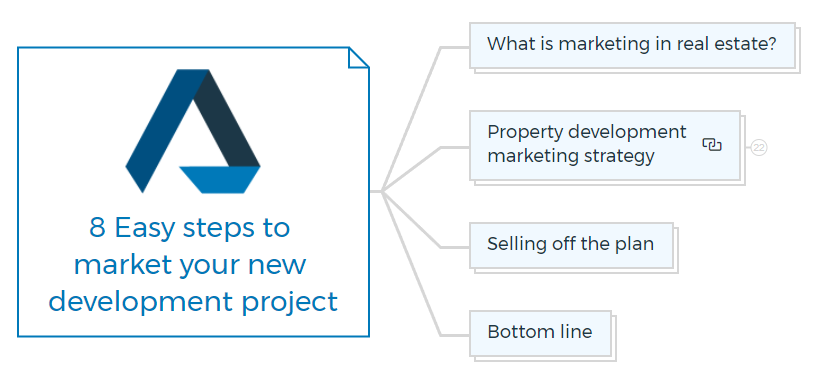
What is marketing in real estate?
Marketing in a development project is more than simply appointing a marketing team to market and sell the finished structures.
It begins with a developer who can comprehend the market and the personality and traits to sell their concept to others, such as the council, investors, and bankers, right from the start.
In essence, developers are risk-takers responsible for monitoring and controlling the development process. They are visionaries who seize development possibilities and then sell their vision to everyone engaged in the development process to earn financially from their efforts.
The developer's marketing role does not end when the product is bankable (that is, they have secured development approval and development finance). They must identify and hire the most effective marketing and sales team to help them sell their product.
They must be entirely market-driven. All of their decisions should be based on the market's background and potential purchasers and tenants. They should be focusing on the end user's needs. It includes the beginning of the concept, the selection of the location, the design of the building, to the last finishing touches.
Beyond advertising and face-to-face selling, whether promoting a small home project or a golf course estate, various marketing activities are required. Property developers must be well-versed in the real estate industry, consumer behaviour, and construction.
Learn the ropes of the real estate business with this tried-and-true A to Z guide to property development. The course will equip you with the knowledge and skills necessary to launch a successful real estate career, in addition to teaching you the latest developments in the field.

The principle of 80:20
The Pareto principle suggests that 20% of your efforts achieve 80% of your intended outcomes. In other words, most results come from a few significant steps—not many smaller ones. It's another way of saying you get what you pay for.
The Pareto Principle is helpful in various fields, including manufacturing, management, and human resources. Pareto used it to explain how 20% of the Italian population possessed 80% of the country's property.
The technique can be used for sales in property development marketing: roughly 20% of your buyers produce 80% of your sales. In other words, two out of every 10 potential purchasers will become genuine sales. It's also possible to use it in a slightly different method.
When looking at the demographics of possible buyers surrounding a planned project, it's estimated that 80% of them will live within 20 kilometres of the project.
Before commencing and promoting development, a property developer should understand the supply chain, the source of future property demand. This is easier said than done because estimating future property demand is arguably the most challenging issue a property developer has.
Expert forecasts are often inconclusive because they are made with a time lag. As a result, developers should consider the market's fundamentals and probability while making development decisions rather than aiming for a specific forecast.
Here are a few of the principles to think about.
- Increased population
- Immigration
- Demand and supply
- Changes in demographics
Based on these characteristics, there will be a continuous demand for homes. In the long run, this is best for residential property developers.
However, given the cyclical nature of real estate, how does a developer assess short-term demand for their product?
A property developer should research the market and ask the following questions:
- What are the most recent real estate pricing trends?
- Why are prices rising or staying the same?
- What is the source of demand?
- What is the source of supply?
- Are investors causing market turbulence?
- Are SMSFs causing market turbulence?
- Are foreign investors causing market turbulence?
- Will home prices continue to rise?
Get The Edge Now!
Discover the transformative power of our FREE EDGE platform and
unlock a world of opportunities at no cost!

Your Real Estate Toolkit Awaits!
Free eBooks, Courses & Feasibility Suite Trial—Join Today!
✓ Unlimited FREE Trial: Experience the full power of our Feasibility Suite with hands-on demos
—explore without limits, no time pressure & without commitment or credit card!
✓ Learn from Success: Dive into real-life case studies for practical insights.
✓ Engage, Inquire, and Innovate: Ask questions, request features, and engage in lively discussions.
✓ Showcase Your Projects and Gain Insights: Share your projects and get personalised feedback.
✓ Free Resources Galore: Access a treasure trove of free resources,
eBooks & courses to keep you informed.
✓ Exclusive Training: Enjoy members-only training to sharpen your skills.
Property development marketing strategy
The primary purpose of residential development marketing is to create sales. A holistic real estate marketing approach is required for success, which necessitates the creation of a marketing 'package.' The design, planning, legal, financial, and physical aspects of a development project should all be included in this package.
A developer should follow a systematic strategy when designing a comprehensive marketing package. In practice, the many marketing duties and activities that make up a project marketing package are divided into seven stages:
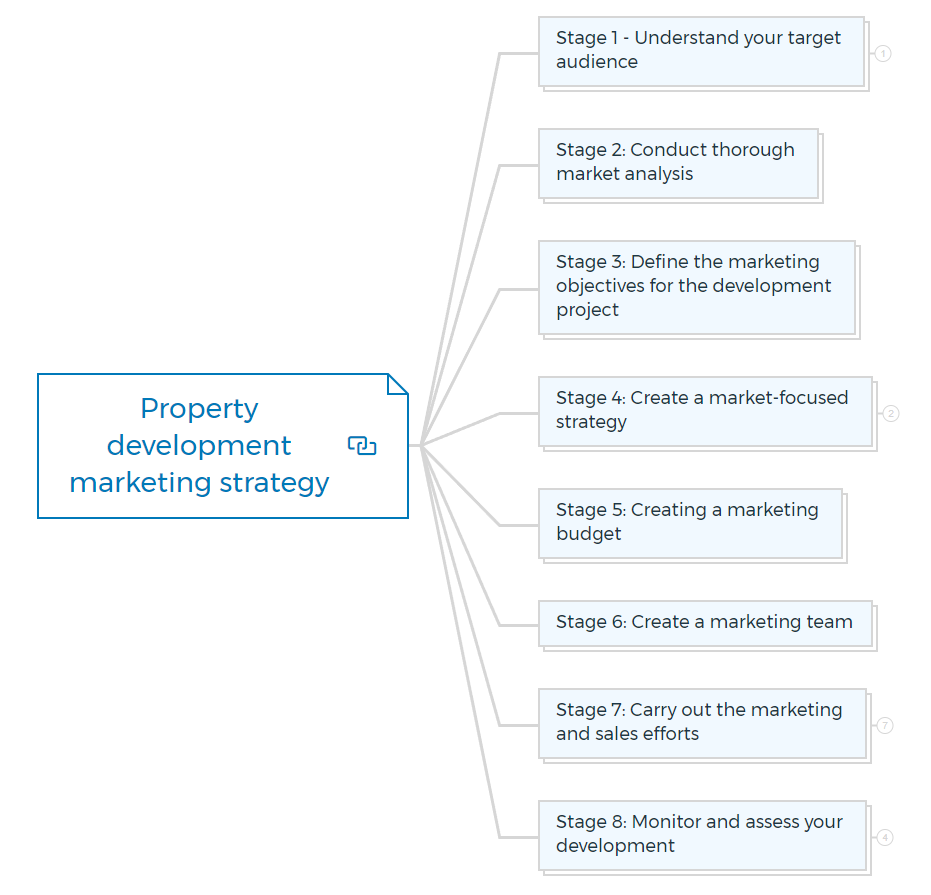
Stage 1 - Understand your target audience
You don't have to be an expert in real estate or construction to understand how marketing affects your development. The key is understanding how people perceive what you're offering and how it compares with competitors in both price and value.
Before investing in marketing, make sure you know your customers and their needs. Below are specifics that will help developers understand better what they're getting themselves into when developing residential property.
Housing market pyramid
The residential market can be divided into three major categories: low-cost, mid-cost, and luxury.
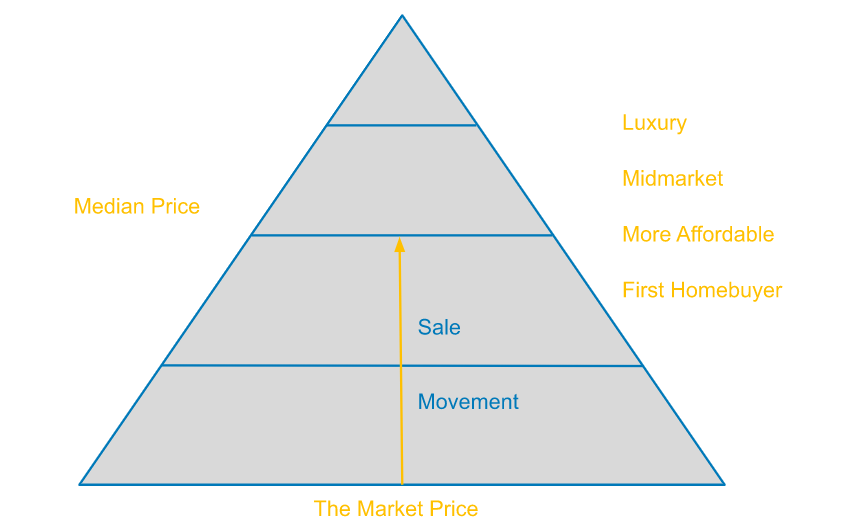
Affordable - The 'affordable' housing market, which accounts for around 40% of all home sales, is at the bottom of the pyramid. First-time buyers, blue-collar workers, young professionals, and retirees who are downsizing comprise the majority of buyers in this category.
Mid-Price - Mid-priced homes and predominantly second or third-home buyers are represented in the middle of the pyramid. Middle-class buyers, comprising highly educated, salaried professionals and managers, semi-professionals, skilled artisans, and lower-level management, make up this sector.
They usually enjoy a comfortable standard of life, a good level of financial security, and a lot of work autonomy, and they rely on their knowledge to get by.
Luxury - The smallest number of purchasers and the most expensive property market segment are represented at the top of the pyramid. The wealthiest 5% of the population are among the buyers in this group. The sector is known for its enormous wealth.
As the number of first-time home buyers rises at the bottom, a chain reaction of sales occurs as prices rise. A strong housing market is driven and sustained by this mechanism. However, in major cities, affordable housing is a severe issue.
The inability to finance a home is a structural problem caused by property prices rising faster than salaries over the last 50 years. Planning, regulatory, and financial restrictions all impact the availability of affordable housing.
Stage 2: Conduct thorough market analysis.
The first step of planning a real estate marketing strategy should be conducting market research. This means surveying your target audience—the people you'll be selling your finished structures to.
While you can undoubtedly do in-person surveys and interviews, it's easier (and much less time-consuming) to launch an online survey. Follow these 13 steps to perform a thorough real estate analysis.
Obtaining statistics and performing market research allow developers to grasp the market, the purchasers, and their demands and better understand their competition.
As a developer, you must first have a comprehensive interpretation of the project and its market position before building a real estate marketing strategy that is appropriate for it.
The following questions can also help you figure out where your project stands:
- Who are the intended purchasers?
- What are these buyers looking for?
- What are the preferences of the buyers?
- How do rival developers cater to the needs of the target market?
- Is there anything better about the proposed project?
The aim is to gain a competitive marketing advantage. In terms of architectural design, planning and price, the developer should offer a better product than or different from the competitors.
Developers will be able to determine where their proposed project is positioned in the market (for example, whether it is high-end, competitive, or low-cost) and whether it has a unique selling position or distinguishing advantage by gathering this information.
However, the developer should not rely solely on these sources and should consult with real estate brokers and other marketing organisations to grasp the target market thoroughly.
Stage 3: Define the marketing objectives for the development project.
Before you dive into your development marketing strategy, there are two things you need to set in place: one, what you want to achieve, and two, how you're going to reach those goals. To figure out your plan, think about your end game for your real estate development project.
Do you want it on MLS? Are you looking for an out-of-state investor who has purchased many properties in your area? Have you already sold off half of it?
Most home developers intend to sell unless they are building to hold, and in most cases, their bank sets sales targets. Banks typically require pre-sales before releasing any cash for development, depending on the developer's experience.
Generally, banks will require pre-sales to fund construction costs equal to 70% of the entire development cost or 65% of the project's ultimate value.
Stage 4: Create a market-focused strategy.
A marketing strategy, particularly in real estate, is concerned with how to get people excited about your product and want to come in and buy it. The goal of any real estate developer is simple: build something worth buying.
However, getting customers through your door isn't just about building; it's also about how you tell potential buyers why they should purchase your building over any others on offer. This is where marketing strategies come into play.
The developer should select marketing efforts that are appropriate for the project and potential buyers. It is meaningless to advertise on national television if the initiative targets people within a limited market radius and class.
To get the marketing message across, it's also a good idea to choose numerous activities that complement one another. For example, a developer attempting to build a new product in the market might opt to advertise on local radio, create a social media presence, and offer first-time homebuyers a low-cost pricing approach.
These complimentary tactics, when utilised together, will help you reach a larger market.
If the project is highly competitive, the developer may consider different strategies. The possibilities listed below are worth examining.

Financing for developers
Prospective buyers can be offered financing arrangements by the developer and financier. These packages may have an interest rate fixed lower than other finance competitors for the first few years.
Sales in instalments
Although not frequent, property sellers may employ instalment sales to realise gains over some time or when the market demands that the deposit be split into several instalments over a while. This benefit is spread out over the life of the debt in proportion to the number of payments received.
Stage 5: Creating a marketing budget.
If you're in charge of marketing your new business, it's essential to determine how much money you can spend on advertising. This will allow you to figure out where you should spend most effectively.
It may seem more realistic that you have the little-to-no budget for advertising at first, but you must get started with some plan so that you don't sink your own company by spending anything at all.
The nature and scale will determine the cost of a development project. The marketing budget will grow in tandem with the project ambitions. It will be refined regularly based on the design concept and marketing strategy.
Marketing is costly, but you must invest some funds in its promotion no matter how good your development is. Keep in mind that marketing money is an investment; what you put into it influences what you receive out of it.
Depending on the type and size of the project, the budget should be revised every week, month, or quarter. The marketing funds could be used to attract people to the project.
If the marketing agency cannot attract visitors, they should try another strategy and alter prices within the budget. A sample list of broad areas that you can include in the marketing budget is as follows:
- Fees and expenses incurred by advertising agencies
- Costs for public relations
- Cost of setting up a marketing and sales office, including rent and furniture
- Renderings/plans/elevations, architectural model
- Printing and brochures
- Signage
- Displays
- Advertisements
Stage 6: Create a marketing team
The developer should opt for the best when looking for a team to help with the marketing plan. The developer may hire an in-house team or hire additional specialists who specialise in real estate marketing and sales. If the latter option is chosen, one should investigate the company's references and track record.
Professionals who know the area and community where the project is located are better positioned to market it. The following is a list of possible marketing team members. Their choice will be determined by the size and type of project to be promoted.
- Advertising agencies
- Public relations firm
- Real estate agents
- Project marketing consultants
Stage 7: Carry out the marketing and sales efforts.
The success of any real estate development project can often come down to sales and marketing. While technical factors are crucial, there are ways to ensure that your product shines. Here are some significant factors that can help you formulate a solid marketing strategy for your subsequent real estate development.
Marketing aims to get the most out of your advertising while wasting the least amount of money possible by making it response-driven and measurable. The marketing team for the developer should advise on the type of marketing channel to employ.
The developer can choose from various mediums, each with its advantages.
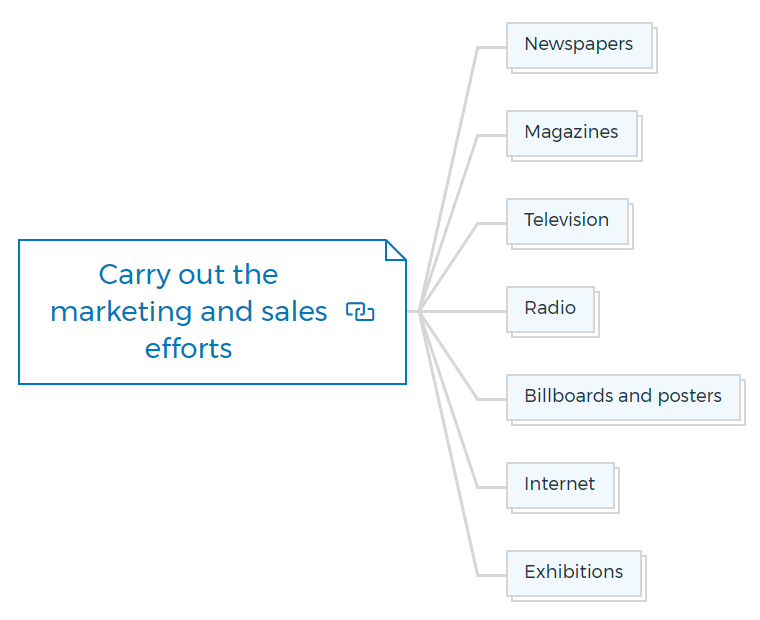
Newspapers
National and local newspapers, including daily and weekend editions; weekly, community, and organisation newsletters; and, of course, industry periodicals are among these publications.
The advantage of advertising in any newspaper is that it usually has a high distribution rate. You could want to limit sales to a specific geographical area. In that situation, you might wish to consider a more targeted strategy.
Magazines
Magazines have a high rate of distribution. The advantage of advertising in a magazine is that it has a longer shelf life and is frequently more market-oriented than a newspaper.
To decide which to use, inquire about the publisher's statistics. These will include distribution statistics and reader demographics such as age, income, industry, and frequently much more. Look for a publication that caters to your specific niche.
Television
Television commercials are thrilling, but they are also costly. It's also one of the most cost-effective ways to advertise. A large audience, timing, attention are all advantages.
If you have no idea of television marketing, you shouldn't do it without the help of an expert. These experts can also help you with demographics, channel comparisons, tone, and times, among other things.
Radio
Radio has a sizable audience in several cities. Radio has become a source of pride and virtually a status symbol in some areas. Radio stations will have their audience depending on demographics like age, income, and location. Choose the station that best fits the demographic you're going for.
Billboards and posters
Compared to locations in America and Europe where such advertising is quite popular, poster and billboard advertising is limited in Australia. Full colour, coverage control, and location flexibility are advantages of poster advertising.
Posters are an excellent medium for awareness campaigns in general, and if you have a captive market, such as bus stops, you may enlarge the copy and include phone numbers and addresses.
Internet
We've recently observed an increase in the use of the internet to market real estate. It is critical to use this sort of marketing as more households and businesses come online every day.
Thanks to new technologies, you will be able to generate virtual walk-throughs and 3D models of your development before physical construction begins. This type of marketing will benefit developers who want to sell a portion of their development 'off plan' before committing to the entire project.
This is a low-cost approach to getting your word out to the public instead of the significant capital costs involved in your development.
Exhibitions
Trade shows and even seminars fall within this group. These have huge advantages. For starters, it is the only venue where a significant portion of your target market will go to and visit your booth or premises to learn more about your project.
Exhibition organisers frequently establish databases on attendees and exhibitors, making follow-up simple and ongoing communication possible. The time you spend at seminars, trade shows, and exhibits is solely dedicated to your product and potential customers.
Make sure that the visitors' demographics match your target market before hiring your space. Find out how many people attended the most recent expo, trade show, or seminar.
Stage 8: Monitor and assess your development.
By measuring and analysing the return, you will know what you got out of it. If your marketing strategy isn't working, go back to the drawing board and revise it.
Depending on the type and size of your project, you should update your budget every week, month, or quarter. As needed, take corrective action.
Developers frequently struggle to determine whether their marketing strategy is effective. When various marketing activities are used simultaneously, this might be problematic.
A few methods for evaluating the progress of a marketing plan are listed below.
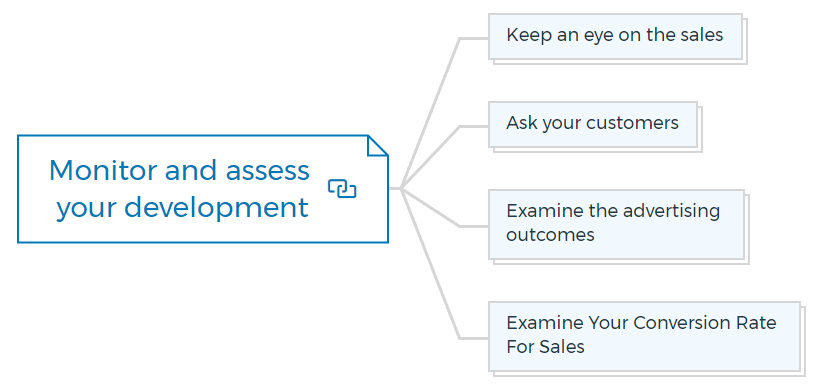
Keep an eye on the sales.
They need to be steadily increasing. Remember that specific markets have a lengthier sales cycle than others, so be cautious about what you're measuring. You should also track the number of new leads or appointments made to get an accurate picture.
Ask your customers.
Check out how they heard about your project. This will provide you with valuable insight into why buyers chose your project over others.
Examine the advertising outcomes.
You should take action to improve response rates if they aren't working. Make sure you're using suitable media and that you're selecting media that will appeal to your target audience.
Make your statement as specific as possible. Change the copy or redesign the advertisement's appearance. Use a powerful headline that poses a relevant question or makes a solution-oriented remark.
Examine your conversion rate for sales.
The simplest way to determine if your conversion rate has improved is to look back at your previous data. Because selling is a critical component of the marketing function, rather than focusing solely on generating new leads, make sure you evaluate your effectiveness in closing the sale.
Selling off the plan
Pre-sales or 'off plan' sales of development can be incredibly challenging at the best times. Pre-sale is, unfortunately, sometimes a requirement of the development funder. These institutions will only give development financing if they demonstrate that the idea has a market.
They will also set a percentage of the development that must have genuine sales commitments before being funded. The economy and the number of buyers in the market will determine whether or not residential units are pre-sold.
The marketing agent will try to secure signed agreements for reservations for buyers to purchase during the pre-selling stage. These offers may include a lower price or additional concessions to get a buyer to commit before viewing the finished project.
Various public relations events and publications about the development's progress, as well as mailings to interested parties about the construction and sales/leasing progress, will all be part of an efficient pre-sale marketing campaign. Some pre-sale marketing tactics are listed below.
- Promotional events before the launch
- Run a campaign to collect registrations of interest (ROI).
- Offer a discounted pre-sale rate.
- Display unit
- Database marketing
Bottom line
Most developers I've met aren't market-driven. They think if they build something, buyers will come. That is far from the truth. I've explained the necessity of marketing and how to include it in your development company.
You and your marketing team should not be responsible for all aspects of marketing. Develop a robust and supporting infrastructure across your team, so they consistently promote the project and feel part of it.
Convert your development project to success. Join my 3 days property development workshop to achieve new heights in your real estate career.
FAQs

